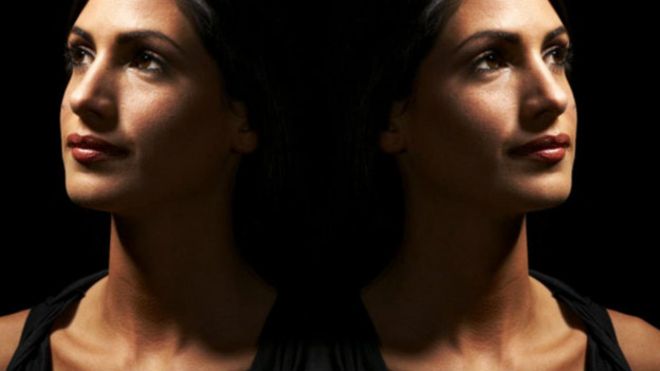求职面试心理学
BBC玛丽亚·阿塔纳索夫(Maria Atanasov)(2016年2月2日)

面试中,似我效应是一种可以用到的技巧。(图片来源:Thomas Northcut/Thinkstock)
在残酷的常常让人泄气的网上求职世界里,能最终进入面试环节本身就是一个值得称道的壮举。即使是勇气可嘉的求职者,对面试也会充满焦虑。
您为面试悉心准备,精心挑选权力套装,现在,关键的一天终于来临。我们在问答网站 Quora 为您找到一些面试中能用到的心理学方法和技巧,它们能帮助您提高面试的成功几率。
面试中,求职者怎样才能赢得招聘专员的青睐呢?他们需要保持镇定,利用身体语言的力量。
手势能说明
您的手势既能给人正面印象,也能给人负面印象。苏珊·贝瑞(Susan Bearry)认为,在问候面试官时,没有什么比冷冰冰的握手更糟糕的事情了。她写道:“温暖干燥的手掌会激发人的信心,而湿冷的手掌很大程度上会令人下意识地兴趣顿失。如果您面试时提前到达,最好先去趟洗手间,用热水或者烘手机让自己的手暖和起来……心理学研究表明,即使是端着一杯热咖啡,也会让交谈对象留下更为正面的印象。”
面试开始后,要尽量少用手势,以减少对谈话的干扰。沙拉德·杜曼恩(Sharad Dhumane)写道:“要让自己的双手保持休眠模式。”即使要用手势,也要缓慢,幅度不能太大。
要避免双臂交叉的姿势,梅林达·爱德华兹(Melinda Edwards)写道:“这样做所释放的信息是,您自己持封闭态度,不愿去理解对方。”
似我效应
赞贝利·塞拉·费德里科(Zambelli Sylar Federico)建议,面试中可以仿效面试官的身体动作来赢得其信任。他表示,好的销售人员往往会利用这个技巧帮助成交。“您可以仿效对方的动作、语气、手势、呼吸节奏等等,主要是要为了做出这样的表示:‘嗨,我们步调一致。’我们是一类。您可以相信我。”他这样写道。
费德里科还表示,但您的表达必须微妙。他解释道:“对方用左手挠挠鼻子,您则用右手摸摸脸。对方交叉小腿,您交叉小腿的方向就要和他们相反,如此等等。在您对身体语言感到自信后,您可以继续(仿效)对方的语气:您也许早就知道,有人说话很快,断断续续,有人说话很慢,还有人说话富有节奏。”
放慢节奏
时间当然很重要,但这并不意味着在面试时您要匆匆忙忙。贝瑞写道:“我曾经有个老板(在面试中)真的就进入了冥想状态。他事后告诉我,他的确喜欢我在面试中缓慢深长的呼吸,因为他知道,我在压力下会镇定自若,这会帮助他保持镇静。交谈中短促的呼吸或者上气不接下气是紧张情绪的明显流露,只会让面试官也变得焦躁不安。”
回答问题时,不要每次都迫不及待地立即做出回答。蒂姆·希(Tim Chi)写道:“当问题可能让您出错时就特别要注意这一点。多花点儿时间思考该怎么回答没有错,有时候甚至更好。”
他写道,这样做能从两方面帮到您:
- 缓解一些压力,回忆起一些准备好的对策。
- 这还能反映出自信:你思考一下再回答,而不是匆忙作答,这给人传递的信息是,您很了解自身的价值。
有一个警告是:“不要间隔太长时间再回答问题,否则您就会显得呆滞和紧张。”蒂姆·希这样写道。
行为自信,但不要过火
在实际上很焦虑时怎样才能表现得自信呢?
设法不要表现出来,而且绝对不要为此道歉。
心理治疗师约翰·桑尼坎德罗(John Sannicandro)认为:“身体语言和非语言沟通是通过面试不可或缺的成功要素。通过练习坐姿、站姿和走路姿态都能增加您的自信。”
爱德华兹补充道,您还要微笑,保持与面试官的眼神接触,不要显得心神不宁。她写道:“面试官因为看到您心神不宁也会多少变得不安起来。”
紧张不安的求职者也许不会让雇主青睐,但过于自信同样会发出错误的信息。卡罗尔·格里姆利(Carole Grimley)写道:“他们可不想要一个傲慢自大的家伙;除非您在自己的领域已经声名显赫,他们才会忽略这一点。您只要彬彬有礼、言行举止保持正常就好了。”
仔细聆听,谈吐得体
适时插话和回答问题很重要,但不要打断对方,这样能让面试官觉得您能够胜任工作。贝瑞写道:“有时求职者急于表现自己‘明白了’或者他们领悟得快,但是,没有人喜欢自己说话被打断。”
另外,您还要避免长篇大论。杜曼恩写道:“除非情势所迫,否则您还是要谨言慎行,只要表现自然就好了。”
观察对方反应
面部表情也很能说明问题,但这是双向的。面试官观察您时,您也应该观察对方,还要注意对方的反应。
山志乃(Shino San)认为,认识到对方是否对您的谈话感兴趣十分重要。山志乃表示:“如果对方似乎兴趣索然,您即使还有很特别的东西要说也要学会停下来。您说话要精确,如果对方对您的话题感兴趣,就要大声表达。您要让对方认识到您的能力和他们应该聘用您的原因。”
(责编:林杉)
The psychology of the job interview
By Maria Atanasov,2 February 2024
In the brutal, often disheartening world of online job applications, landing a face-to-face interview has become a commendable feat in itself, and can instill anxiety in even the bravest of applicants. You’ve prepped for the interview, picked out the power suit and now it’s time for the big day. We turned to question-and-answer-site Quora for some great psychology tips, tricks and techniques to use during a job interview to increase the chances of nailing in the position.
Here’s what respondents had to say about winning recruiters over, putting on your game face and the power of body language.
The hands have it
Your hands can make a positive or negative impression. There’s nothing worse than a cold handshake when you greet an interviewer, according to Susan Bearry. “Dry, warm hands inspire confidence. Cold, clammy hands are a big unconscious turn-off,” she wrote. “When you get there early, go to the bathroom and warm your hands, either under hot water or under a hand dryer…Psychological studies have shown that even holding a warm cup of coffee makes someone feel more positive about the person he or she is talking to.”
Once the interview begins, keep hand gestures to a minimum so as not to detract from the discussion. “Keep your hands in sleep mode,” wrote Sharad Dhumane. “If you use them, let it be a slow, small movement.”
Resist the temptation to cross your arms, Melinda Edwards wrote: “This gives off the vibe that you're closing in on yourself and not willing to understand.”
Mirror, mirror
Zambelli Sylar Federico recommends mirroring your interviewer’s body movements to gain their trust. It’s a technique, he said, good salesmen often employ to close deals. “By mirroring their movements, tone, gestures, breathing pace and so on, you're basically communicating: ‘Hey, we’re playing the same tune here. We're akin. You can trust me,’” he wrote.
But, you have to be subtle, Federico noted. “They scratch their nose with left hand, you touch your face with right hand. They cross their legs, you cross legs the opposite way. And so forth,” he explained. “After you feel confident with body language you might want to move on with [mirroring] tone [of voice]: as you may be well aware, some people speak at a very fast and intermittent pace, others are very slow, others have instead a rhythm.”
Slowing things down
Time is of the essence but that doesn’t mean you need to rush the interview. “I once had a boss who was really into meditation and he told me later that he really liked that I breathed slowly and deeply in our interview because he knew I would keep cool under pressure and would have a calming influence on him,” wrote Bearry. “Short, rapid breaths or running out of air when talking is a clear sign of nervousness and it can make your interviewer edgy as well.”
When answering a question, don't feel compelled to answer immediately every time, “especially if you get a question that could trip you up,” wrote Tim Chi. “It is OK, and sometimes even preferable, to take some extra time to think over your response.”
This, he wrote, can help in two ways:
- It takes off some of the pressure to memorise canned responses.
- It projects confidence: When you take some time to answer, instead of rushing, it communicates to people that you know your own value.
One caveat: “Don't wait that long, or else you might just seem spacey and nervous,” Chi wrote.
Act confidently but don’t overdo it
How can you project confidence when you’re anxious?
Try not to let it show and never apologise for it.
“Body language and nonverbal communication is a missing piece of what makes for a successful interview,” according to John Sannicandro, a psychotherapist. “Practice the way you sit, stand and walk to increase your confidence.”
Smile, maintain eye contact with the interviewer and try not to fidget, added Edwards. Fidgeting, she wrote, “makes the interviewer uncomfortable somehow, because they see how restless you are.”
While a nervous candidate may not endear themselves to an employer, acting overly confident can also send the wrong message. “They don't want an arrogant jerk, unless you're already famous in your field; then they'll overlook it,” Carole Grimley wrote. “Just be polite, act the way everyone else does.”
Listen carefully, talk when appropriate
It’s important to chime in and answer questions so an interviewer gets a sense whether you can do the job, but never interrupt your interviewer. “Sometimes interviewees are over eager to show that they ‘get it’ or that they are a quick study, but no one ever likes being interrupted,” Bearry wrote.
Also avoid long speeches. “Unless demanded by the situation, use your mouth sparingly,” Dhumane wrote. “Just be natural.”
Observe reactions
Facial expressions can be very telling, but it works both ways. While an interviewer is observing you, you should also be observing them, taking note of how he or she reacts to your responses.
The important part is to know if they are interested in what you have to say, according to Shino San. “If they seem disinterested, learn to stop speaking even if you have something amazing to share,” San said. “Be precise, and if they show interest in your topic, speak it loud and up. Let them know who you are and why the want you.”